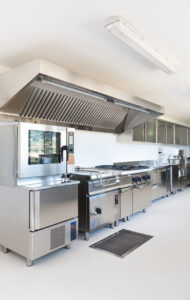
Commercial kitchen fire inspections aren’t just critical for safety purposes. They’re required by NFPA regulations.
A commercial kitchen is a hotbed of activity that is centered around cooking equipment that is potentially dangerous if not managed properly. Restaurants and other businesses with commercial kitchens need to undergo regular fire inspections as required by local codes. This can help to avoid a major fire that can injure an employee or customer or put them out of business.
Peak Season
Restaurant peak season happens during the summer. It typically begins in late April and lasts through early September. The more you use your commercial kitchen, the more likely a fire may start. This is why the peak season is one of the most important times of the year for a fire inspection.
Fire inspections can help determine whether your current fire safety systems and procedures comply with National Fire Protection Association (NFPA) standards—these are put in place for the safety of all employees and customers. With fire protection systems, the main goal is to protect human life. However, these systems also protect property and keep your business running by containing a fire and minimizing damage.
Holiday Season
Restaurants also see an increase in business during the holiday season. Many people visit with family and friends at restaurants during the holidays. This is another good time to undergo fire inspections on your facilities and systems.
NFPA Regulations
NFPA regulations require fire suppression systems in commercial kitchens to be inspected every six months—this works well because you can plan to do these during the peak seasons if you wish. For instance, performing fire safety inspections on your fire extinguishing systems in June and December will provide coverage for each peak season and minimize the risk of a fire.
According to NFPA:
- Solid fuel cooking operations need to be inspected monthly (every month).
- High-volume cooking operations (24-hour cooking, charbroiling, and wok cooking) need to be inspected quarterly (every three months).
- Moderate-volume cooking operations need to be inspected semiannually (every six months).
- Low-volume cooking operations (churches, senior centers, etc.) need to be inspected annually (every year).
Failing to comply with NFPA regulations puts your staff, patrons, and business at risk. In addition to compromising the safety of everyone in the building, those found in violation of NFPA regulations will be fined and forced to get their systems repaired before they are allowed to open back up for business.
Fire Protection Services from Fireline
Whether you need smoke detectors, fire extinguishers, or an automatic sprinkler system installed at your commercial property, Fireline has you covered. We have been protecting people and property from fire damage since 1947—and our experience shows in our excellent work! We are known for our superb customer service, our expertise, and our reliability. For more information on how we can help your residential or commercial property, visit us online or give us a call at (800) 553-3405. We are in Baltimore, MD, with a second office in Leesburg, VA. For more fire safety tips, be sure to follow us on Facebook, Twitter, and LinkedIn.
